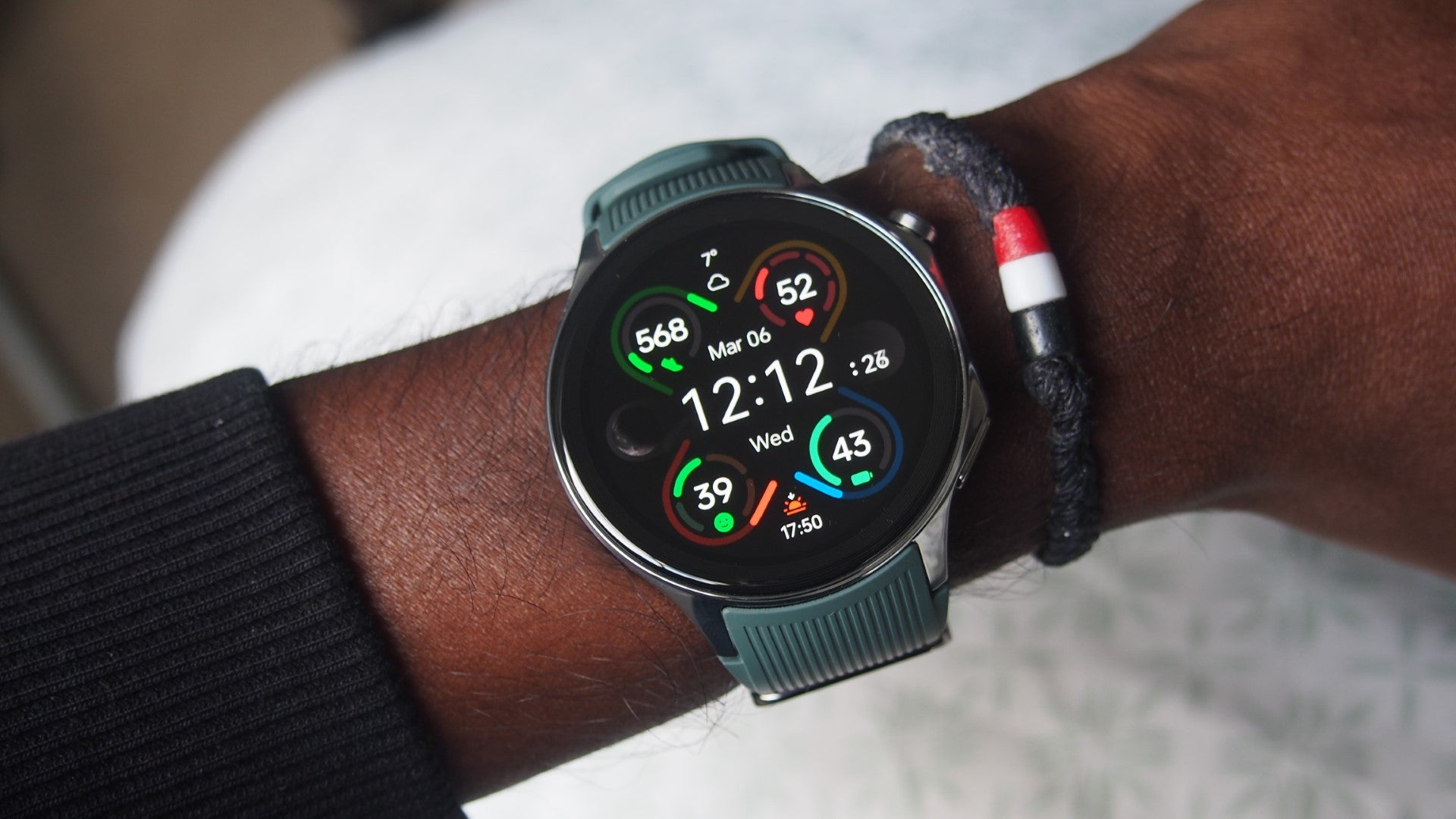Garmin Vivosmart 5 Review
The smartest band you’ll find at this price
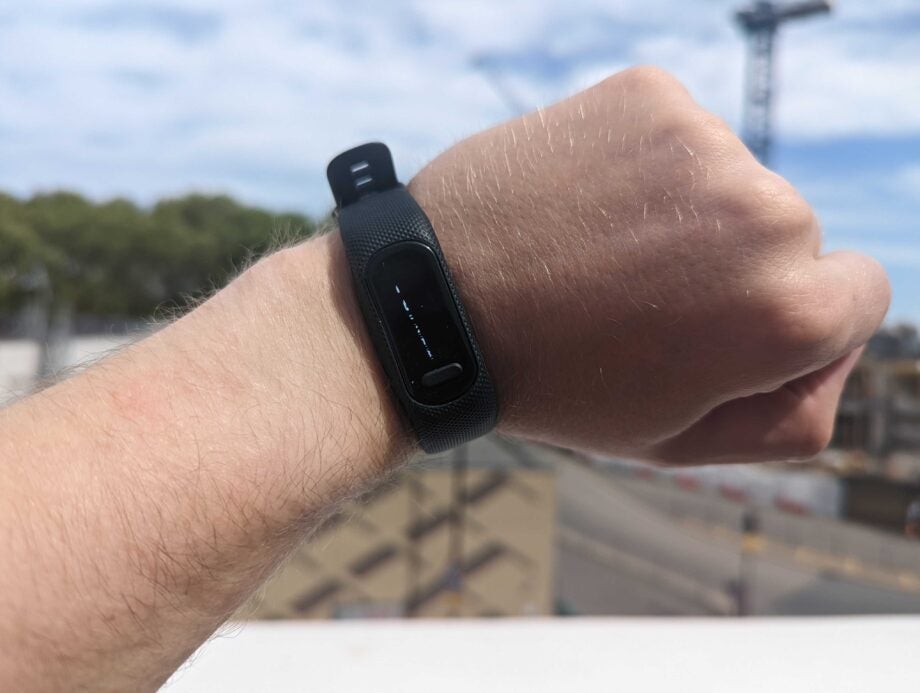

Verdict
The Vivosmart 5 is Garmin’s latest answer to the Fitbit Luxe and Charge 5. It’s a slim-form-factor band design wearable designed for runners that want a discreet wearable to track their weekly workouts and 5km runs or cycles. While it’s far from the prettiest wearable, it’s by the far the smartest you’ll find at this price offering decent fitness tracking features, a comfortable, swim-ready fit and lengthy battery life. The only downsides are that its small design means that it can be hard to take advantage of its limited notifications functionality and the lack of an in-built GPS means you’ll need to take your phone with you if you want reliable distance tracking.
Pros
- Reliable fitness tracking for the price
- Week long battery life
- Comfy gym-ready fit
Cons
- Screen is too small for most notifications
- Limited smartwatch functionality
Availability
- UKRRP: £129.99
- USARRP: $150
Key Features
- 14 different activity tracking options Options include walking, cycling, outdoor running, treadmill running, swimming, strength, cardio, stair stepper, pilates, yoga HIIT breathwork, indoor rowing and “other”
- 7 day battery lifeThe Vivosmart has a quoted week long battery life, though this will radically shorten if you take advantage of some of its always-on tracking options
- Interchangeable band designThe Vivosmart has an interchangeable band design that lets you customise its colours using option bands available from Garmin
Introduction
The Vivosmart 5 is the latest fitness band from Garmin, the company behind some of our top-rated enthusiast watches to date.
Rather than going after serious athletes, like the Fenix and Forerunner lines that are a consistent presence in our best fitness tracker and running watch guides, the Vivosmart 5 takes aim at the entry-level market currently dominated by Fitbit with its Luxe and Fitbit Charge 5 wearables.
I have been using the Vivosmart 5 as my primary fitness tracker for a week now and it’s an excellent option for newbie runners, swimmers and gym fans looking to get serious about their workout. The device offers superior tracking options and more robust post-workout analytics than its rivals. But its focus on function means some niceties have been cut that can make it less pleasurable to use outside of workouts than most rivals.
Design and screen
- The Vivosmart is well built and will survive the odd accidental bump or scrape
- Changing the strap is very easy to do
- The new physical button on its front makes it a lot easier to use
Out of the box, the Vivosmart 5 has a very unassuming look. My sample was a matte black rubber band that looks like a slimmed down version of the Vivosport we reviewed in 2018 and previous generation Vivosmart 4. This means it doesn’t have the visual flair of its Fitbit Luxe rival which has a coloured lining around the central unit and smooth finish band options.
The only new design feature is a physical button sitting under the OLED touch screen. While this sounds small it’s a big change for the Vivosmart 5 that makes it significantly nicer to use than past Vivo bands and the Luxe.
When navigating menus, the button acts as a home/back control. From idle it takes you to the activity tracking menu and mid-tracking it acts as a stop/pause control. This sounds like a small tweak, but it makes the Vivosmart 5 significantly more pleasant to us day to day than most of the fitness bands I test.
This is because, while the compact designs are great for comfort, the touch screen’s small dimensions can make them slightly fiddly to use. When exercising, using the inbuilt music controls I’d often either mispress an element or the screen simply wouldn’t register my finger unless I really telegraphed the movement. The physical button fixes this making it far easier for me to return to the watch’s main face, pause music and end my workout without experiencing these frustrations.
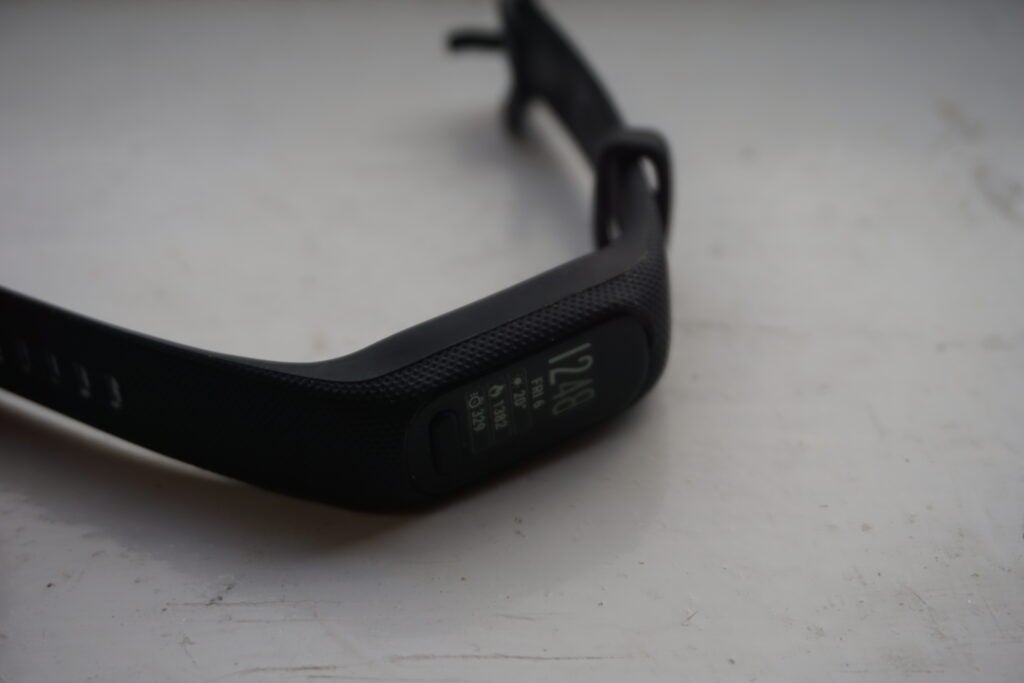
Like previous Garmin devices, the Vivosmart 5 is incredibly comfortable to wear and fairly easy to clean. The watch’s 5ATM water resistance rating let me comfortably swim in my local pool and I could keep it on while showering with zero trouble. 5ATM means the watch is designed to survive depths of up to 50 meters.
After accidentally bashing it into a rock on a climbing wall I can comfortably say the screen is rugged, with it surviving the experience with no noticeable damage. Throughout testing, I’ve not experienced any comfort issues. Even when I was doing an intense HIIT session I never experienced any rubbing or noticed it catching my skin.
Unlike some bands, the main screen is also easily removed from the rubber strap without having to fuss about with clasps. This is a big help and let me easily clean the unit when it began to pick up dirt and smudges after multiple days of use at the gym. All-in-all it’s a wonderfully designed fitness band.
There are some compromises, however. For starters, unlike the Vivosport and Fitbit Luxe, the OLED screen is black and white. This isn’t a deal breaker but coupled with the screen’s small size it does make taking advantage of some of the band’s smart features a little tricky.
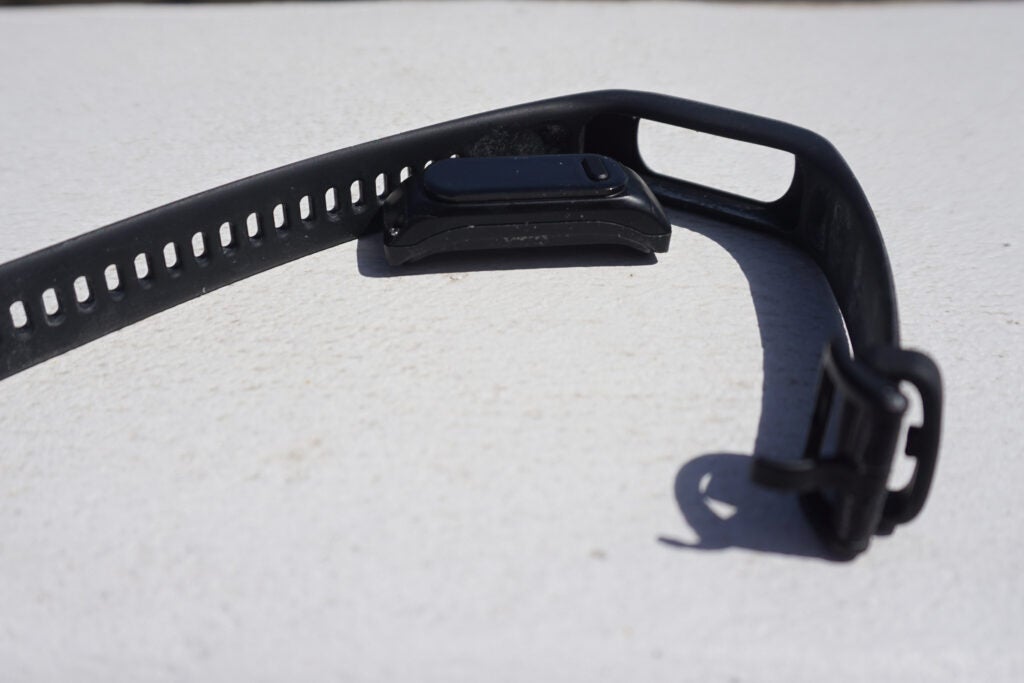
Fitness tracking and features
- The Vivosmart 5 can track 13 different activities
- It offers surprisingly deep health and fitness analytics
- Smartwatch functionality is very limited
The Vivosmart 5’s small screen meant that incoming notification alerts were slightly squashed and hard to read, despite the screen being more than sharp enough and bright enough to remain legible when I was using it on a sunny day. With incoming notifications all I’d generally be able to see was the app, or sender’s name, making it little more than a 90s buzzer on my wrist.
The inbuilt music controls also were a little small and I’d often find myself hitting pause instead of next track, particularly when using the watch mid-run or at the gym.
But this was generally made up for by the watch’s surprisingly developed fitness track analytics, which are a general step up on what you get from most bands.
The Vivosmart can track 13 activities, you can customize the order they appear in the activity menu using the accompanying Garmin app which works on iOS and Android.
This isn’t anywhere near the offering you’d find on one of Garmin’s more premium trackers and the activities on offer tend to have a more generalist focus. Options include walking, cycling, outdoor running, treadmill running, swimming, strength, cardio, stair stepper, pilates, yoga HIIT breathwork, indoor rowing and a nebulous “other”. This is far removed from the Fenix 7 which includes much more specific features for everything from surfing to cross country skiing. But based on my experience, what’s here is more than good enough for most.
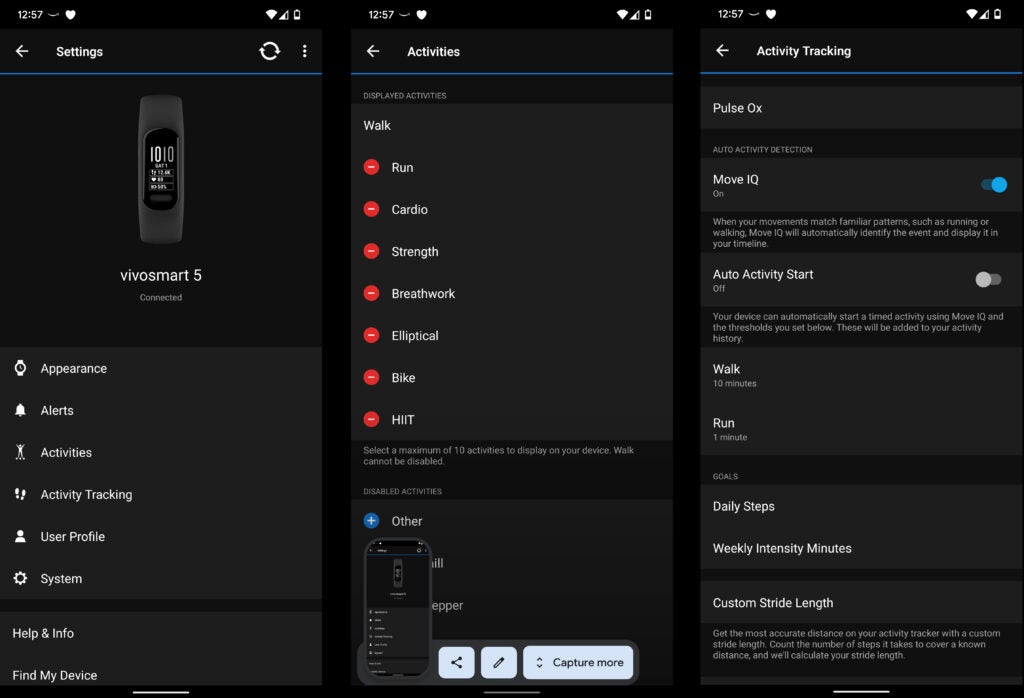
Tracking is generally excellent with one caveat – there’s no inbuilt GPS. Unlike the Vivosport, all you get is connected GPS, which means you’ll need to have an active connection between the Vivosmart 5 and your phone if you want accurate distance tracking.
Considering the price, and the fact its direct rival the Fitbit Luxe also doesn’t have one, this isn’t a deal breaker, but it will be an issue for people that want accurate distance tracking without needing to lug their phone with them.
Testing it on a route I know is 5.3km the connected GPS functionality did work well, however. Though the Fenix 7 I tested it against was undeniably quicker to pick up a signal, the Vivosmart 5 never felt like it was taking extortionately long to connect to my phone’s GPS.
Over the three runs I did the discrepancies in distance were within their usual range, with the Vivosmart 5 never being more than 0.3 km out of whack, outside of my third run where it looks like my phone lost its connection. The discrepancy is in line with the results I’ve gotten testing other connected GPS trackers in the past and will only be a real issue if you plan to run longer distances.
Heart rates are also in line with what you’ll find on most bands. This meant that though they were good at showing trends, they weren’t as accurate as the HRM strap I tested them against, with the band constantly showing higher results. The Vivosmart also struggled with rapid changes in my heart rate.
On one occasion the numbers it threw at me during a HIIT looked more like a hummingbird’s than a human’s leading to it throwing up an abnormal heart rate alert that wasn’t relevant or in line with what I was getting on the HRM strap I tested it against.
Sleep tracking is also good, especially when paired with the band’s SpO2 sensor, which is used to track blood oxygen levels. This is a key metric for health that lets you spot potential issues with your breathing. The Vivosmart 5 was generally good at offering a God’s eye view of my sleeping pattern. The only real issue I noticed is that it could on occasion register extended sessions watching Netflix before bed as light sleep.
What sets the Vivosmart 5 apart from its rivals, like the Fitbit Luxe, is the post workout analytics it then offers. Unlike Fitbit, which requires you to pay a subscription fee to unlock your full workout data, Garmin includes it all for free.
The watch will offer a full suite of data including your intensity minutes plus useful metrics like your body battery and VO2 Max estimate and fitness age. I’m a particular fan of the latter as it uses a mix of the watch’s data and my BMI to estimate how old I am from a performance perspective. Being told I have the fitness age of a 27-year-old is definitely a compliment at this point.
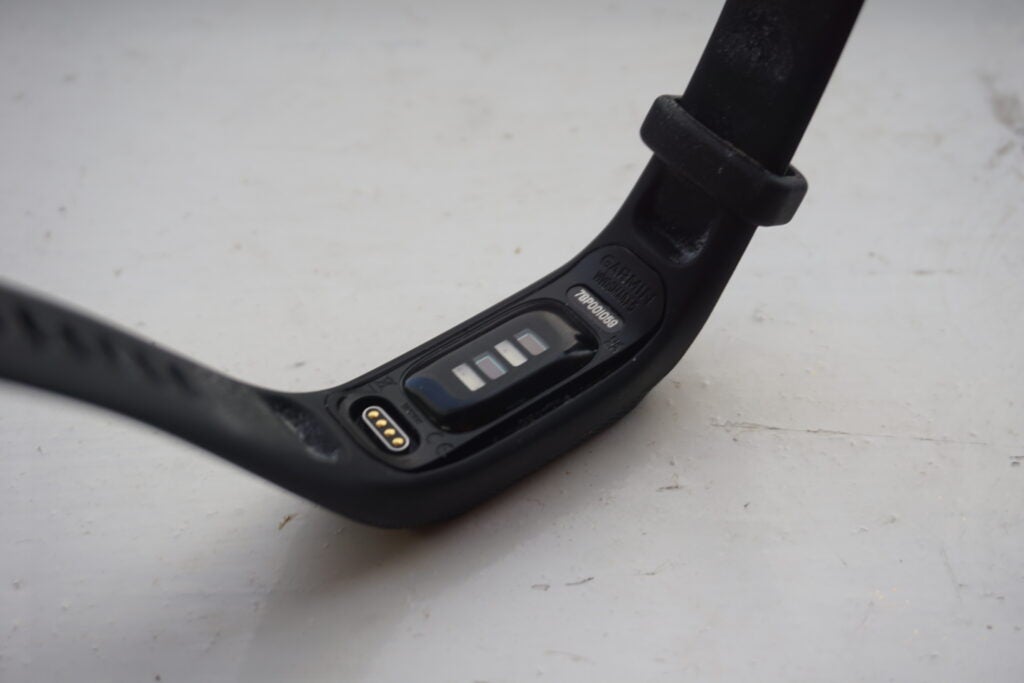
VO2 Max is a key metric that measures how much oxygen you’re taking in while enacting a hard workout. A higher figure is taken as a reliable measure of your overall fitness. The figure on the Vivosmart 5 is called an estimate because to get a reliable reading you have to have a controlled environment and some pretty horrible equipment attached while you enact extreme exercise. The numbers didn’t match the same estimate I got on the Fenix 7, but they were uniform and showed a suitable trend during testing, which is all I’d expect from a wearable this price.
Body battery is a general metric of how much energy you have throughout the day that’s designed to help you know if you need to rest or should do a workout. The Vivosmart 5 doesn’t locally offer recovery time estimates post workout, like its more expensive Forerunner and Fenix siblings do, so the metric is useful. Recovery time is a feature that tells you how many hours you should rest before your next workout.
The monotone screen also doesn’t offer a detailed breakdown on what anaerobic and aerobic benefits you got from the exercise, like the Forerunner and Fenix’s do, but again this information isn’t something I’d expect from a wearable this price. There’s more than enough data on offer to help more casual runners and gym goers keep track of their progress.
Battery life
- Around 7 days of battery life if you limit the feature set
- But it’s closer to 3 days with spO2 tracking on
Garmin quotes the Vivosmart 5 should offer an average of seven days of battery life and this is what I achieved if it’s configured with certain settings.
With the screen brightness set to automatic and the all day SpO2 tracking option off, it will easily last a week. Using it as my primary tracker to keep tabs on my morning 30 minute indoor cycle and 3km I managed to get through Monday to Sunday with around 10% of the battery remaining. Turning on all-day tracking this figure drops significantly and I only managed to get 3 days use out of the Vivosmart before needing to give it a charge.
These figures don’t match the lengthy 2-3 week battery lives I’ve recorded testing Solar variants of the Fenix 6 and 7, but they are still a cut above most smartwatches, like the Apple Watch SE, which struggles to make it past two days use based on our testing.
Latest deals
Should you buy it?
You should buy the Vivosmart 5 if you want a fantastic entry level fitness tracker: Despite looking fairly basic the Vivosmart 5 packs a surprising amount of tracking features and post workout analytics, making it a perfect choice for entry level, or casual gym goers looking to take their workout to the next level.
You shouldn’t buy the Vivosmart 5 if you care about smartwatch functionality: The Vivosmart offers basic notification push services and music controls. But thanks to its small screen even these feel like compromised experiences.
Final Thoughts
The Vivosmart 5 isn’t a revolutionary wearable, but by getting nearly all the basics right it becomes an easy recommendation for those who want to track some of the basics.
The sleek design is comfortable to wear, even after animated workouts and it offered surprisingly detailed, and uniform analytics that made it quick and easy to track progress.
For its target market, the only real downside is that it doesn’t have an integrated GPS, so you’ll need to take your phone with you if you want accurate distance tracking outdoors. If that’s what you’re after you’ll be better off investing in a more premium wearable like the Vivosport or Fitbit Charge 5.
How we test
We thoroughly test every smartwatch we review. We use industry standard testing to compare features properly and we use the watch as our main device over the review period. We’ll always tell you what we find and we never, ever, accept money to review a product.
Worn as our main smartwatch during the testing period
Heart rate data compared against dedicated heart rate devices
Side-by-side GPS comparison with our best scoring smartwatches
FAQs
No, the Vivosmart 5 does not have an inbuilt GPS. If you want accurate distance tracking you’ll need to have it connected to a smartphone.
The Vivosmart 5 does not have local music support. All it can do is control music being streamed from your phone.
The Vivosmart 5 does not support local mapping or directions for run routes.
Full specs
You can see a breakdown of the Vivosmart 5’s core specs and features and how they compare to the Fitbit Luxe and Charge 5 in the table below.




